Fleurs du Mal Magazine


Or see the index
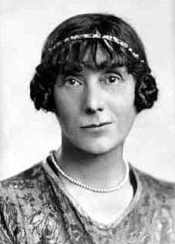
Jessie Pope
(1868 – 1941)
The Zeppelin Armada
‘To-Day, since Zeppelins are in the air,
And folks glance skywards as they go their ways,
Let us hark back a bit to an affair
That happened in Queen Bess’s sturdy days,
When the Armada, backed by Spanish lust
A fleet that floating palaces resembled
Sailed proudly forth to crush us in the dust,
While all the tremulous in England trembled.
What was the fate of those unwieldy craft ?
Our little frigates made of British oak
Harassed the mighty galleons fore and aft,
Handy to strike and shun the counterstroke.
The Great Invasion ended in defeat.
No more could Philip play the part of mocker,
The rout of the Armada was complete,
And down it went to Davy Jones’s locker.
What frigates did in 1558
May be repeated in the air to-day,
When clumsy Zeppelins may meet their fate
From aeroplanes that sting and dart away.
A well-equipped and handy air patrol
Would circumvent an aerial attack.
If London is to be the Zeppes’ goal,
It’s up to us to see they don’t go back!
Jessie Pope
fleursdumal.nl magazine
More in: *War Poetry Archive, Archive O-P, CLASSIC POETRY, WAR & PEACE

Jessie Pope
(1868 – 1941)
War Girls
‘There’s the girl who clips your ticket for the train,
And the girl who speeds the lift from floor to floor,
There’s the girl who does a milk-round in the rain,
And the girl who calls for orders at your door.
Strong, sensible, and fit,
They’re out to show their grit,
And tackle jobs with energy and knack.
No longer caged and penned up,
They’re going to keep their end up
‘Til the khaki soldier boys come marching back.
There’s the motor girl who drives a heavy van,
There’s the butcher girl who brings your joint of meat,
There’s the girl who calls ‘All fares please!’ like a man,
And the girl who whistles taxi’s up the street.
Beneath each uniform
Beats a heart that’s soft and warm,
Though of canny mother-wit they show no lack;
But a solemn statement this is,
They’ve no time for love and kisses
Till the khaki soldier boys come marching back.
Jessie Pope
fleursdumal.nl magazine
More in: *War Poetry Archive, Archive O-P, CLASSIC POETRY, WAR & PEACE
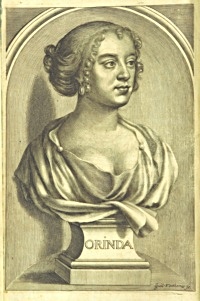
Katherine Philips
(1631-1664)
Epitaph On Her Son H. P.
At St. Syth’s Church
Wher Her Body Also Lies Interred
What on Earth deserves our trust ?
Youth and Beauty both are dust.
Long we gathering are with pain,
What one moment calls again.
Seven years childless, marriage past,
A Son, a son is born at last :
So exactly lim’d and fair.
Full of good Spirits, Meen, and Air,
As a long life promised,
Yet, in less than six weeks dead.
Too promising, too great a mind
In so small room to be confin’d :
Therefore, as fit in Heav’n to dwell,
He quickly broke the Prison shell.
So the subtle Alchimist,
Can’t with Hermes Seal resist
The powerful spirit’s subtler flight,
But t’will bid him long good night.
And so the Sun if it arise
Half so glorious as his Eyes,
Like this Infant, takes a shrowd,
Buried in a morning Cloud.
Katherine Philips poetry
fleursdumal.nl magazine
More in: Archive O-P, CLASSIC POETRY

Katherine Philips
(1631-1664)
L’amitie: To Mrs. M. Awbrey
Soule of my soule! my Joy, my crown, my friend!
A name which all the rest doth comprehend;
How happy are we now, whose sols are grown,
By an incomparable mixture, One:
Whose well acquainted minds are not as neare
As Love, or vows, or secrets can endeare.
I have no thought but what’s to thee reveal’d,
Nor thou desire that is from me conceal’d.
Thy heart locks up my secrets richly set,
And my breast is thy private cabinet.
Thou shedst no teare but what but what my moisture lent,
And if I sigh, it is thy breath is spent.
United thus, what horrour can appeare
Worthy our sorrow, anger, or our feare?
Let the dull world alone to talk and fight
And with their vast ambitions nature fright;
Let them despise so innocent a flame,
While Envy, pride, and faction play their game:
But we by Love sublim’d so high shall rise,
To pitty Kings, and Conquerours despise,
Since we that sacred union have engrost,
Which they and all the sullen world have lost.
Katherine Philips poetry
fleursdumal.nl magazine
More in: Archive O-P, CLASSIC POETRY

Katherine Philips
(1631-1664)
On the Welsh Language
If honor to an ancient name be due,
Or riches challenge it for one that’s new,
The British language claims in either sense
Both for its age, and for its opulence.
But all great things must be from us removed,
To be with higher reverence beloved.
So landskips which in prospects distant lie,
With greater wonder draw the pleasèd eye.
Is not great Troy to one dark ruin hurled?
Once the fam’d scene of all fighting world.
Where’s Athens now, to whom Rome learning owes,
And the safe laurels that adorned her brows?
A strange reverse of fate she did endure,
Never once greater, than she’s now obscure.
Even Rome her self can but some footsteps show
Of Scipio’s times, or those of Cicero.
And as the Roman and the Grecian state,
The British fell, the spoil of time and fate.
But though the language hath the beauty lost,
Yet she has still some great remains to boast.
For ’twas in that, the sacred bards of old,
In deathless numbers did their thoughts unfold.
In groves, by rivers, and on fertile plains,
They civilized and taught the listening swains;
Whilst with high raptures, and as great success,
Virtue they clothed in music’s charming dress.
This Merlin spoke, who in his gloomy cave,
Even Destiny her self seemed to enslave.
For to his sight the future time was known,
Much better than to others is their own;
And with such state, predictions from him fell,
As if he did decree, and not foretell.
This spoke King Arthur, who, if fame be true,
Could have compelled mankind to speak it too.
In this once Boadicca valor taught,
And spoke more nobly than her soldiers fought:
Tell me what hero could be more than she,
Who fell at once for fame and liberty?
Nor could a greater sacrifice belong,
Or to her children’s, or her country’s wrong.
This spoke Caractacus, who was so brave,
That to the Roman fortune check he gave:
And when their yoke he could decline no more,
He it so decently and nobly wore,
That Rome her self with blushes did believe,
A Britain would the law of honor give;
And hastily his chains away she threw,
Lest her own captive else should her subdue.
Katherine Philips poetry
fleursdumal.nl magazine
More in: Archive O-P, CLASSIC POETRY

Charles d’Orléans
(1394-1465)
Ma seule amour que tant désire
Ma seule amour que tant désire,
Mon réconfort, mon doux penser,
Belle nonpareille, sans per,
Il me déplaît de vous écrire.
Car j’aimasse mieux à le dire
De bouche, sans le vous mander,
Ma seule amour que tant désire,
Mon réconfort, mon doux penser !
Las ! or n’y puis-je contredire ;
Mais Espoir me fait endurer,
Qui m’a promis de retourner
En liesse, mon grief martyre,
Ma seule amour que tant désire !
Charles d’Orléans póesie
fleursdumal.nl magazine
More in: Archive O-P, d'Orléans Charles
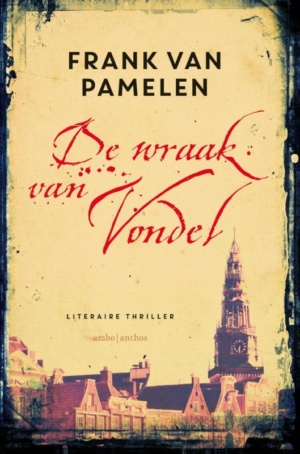 De wraak van Vondel van Frank van Pamelen is een literair labyrint dat teruggaat naar de tijd van Vondel, naar de rederijkers uit de zeventiende eeuw en hun opvolgers. Op twaalf plaatsen in Amsterdam hebben zij sporen nagelaten, aanwijzingen die leiden naar het best bewaarde geheim uit de vaderlandse geschiedenis. Een geheim met gevolgen voor de troonswisseling. Aan journalist Maaike van Reede de taak om het mysterie op te lossen. Ze belandt in een doolhof van dichtregels en cryptische verwijzingen en heeft nog achttien uur tot de troonswisseling. De wraak van Vondel is voor de lezers van Dan Brown en IV van Arjen Lubach.
De wraak van Vondel van Frank van Pamelen is een literair labyrint dat teruggaat naar de tijd van Vondel, naar de rederijkers uit de zeventiende eeuw en hun opvolgers. Op twaalf plaatsen in Amsterdam hebben zij sporen nagelaten, aanwijzingen die leiden naar het best bewaarde geheim uit de vaderlandse geschiedenis. Een geheim met gevolgen voor de troonswisseling. Aan journalist Maaike van Reede de taak om het mysterie op te lossen. Ze belandt in een doolhof van dichtregels en cryptische verwijzingen en heeft nog achttien uur tot de troonswisseling. De wraak van Vondel is voor de lezers van Dan Brown en IV van Arjen Lubach.
Frank van Pamelen werd op 17 juni 1965 geboren in Terneuzen, studeerde Letteren aan de Katholieke Universiteit Brabant en is schrijver, dichter en kleinkunstenaar. Hij woont met vrouw en dochters in Tilburg. Van Pamelen schrijft cabaretpogramma’s, musicals, jeugdboeken, kinderliedjes, columns, gedichten en teksten voor radio en televisie.
Zijn werk was te horen en te lezen bij o.a. De Tweede Ronde, Brabants Dagblad, Trouw, Ook Dat Nog (KRO), VOF de Kunst, Vroege Vogels (VARA), NRC Next, Theater van het Sentiment (KRO), Dit is de Dag (EO) en Cappuccino (NCRV).
Zijn boeken verschijnen bij Ambo|Anthos (literaire thriller), Leopold (jeugdboeken) en Nijgh & Van Ditmar (light verse).
De wraak van Vondel
Een eeuwenoud mysterie, een apotheose in Amsterdam rond de troonswisseling van 2013
€ 19,99
Auteur: Frank van Pamelen
ISBN 9789026329906
Uitgever Ambo/Anthos Uitgevers
fleursdumal.nl magazine
More in: - Book News, Archive O-P, Art & Literature News, Frank van Pamelen, LIGHT VERSE, Thrillers

Andrew Barton ‘Banjo’ Paterson
(1864 – 1941)
The Plains
A land, as far as the eye can see, where the waving grasses grow
Or the plains are blackened and burnt and bare, where the false mirages go
Like shifting symbols of hope deferred; land where you never know.
Land of the plenty or land of want, where the grey Companions dance,
Feast or famine, or hope or fear, and in all things land of chance,
Where Nature pampers or Nature slays, in her ruthless, red, romance.
And we catch a sound of a fairy’s song, as the wind goes whipping by,
Or a scent like incense drifts along from the herbage ripe and dry
– Or the dust storms dance on their ballroom floor, where the bones of the cattle lie.
Andrew Barton Paterson poetry
fleursdumal.nl digital magazine
More in: Archive O-P, CLASSIC POETRY
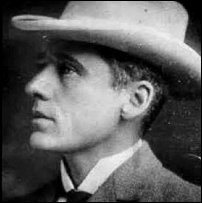
Andrew Barton ‘Banjo’ Paterson
(1864 – 1941)
A Ballad of Ducks
The railway rattled and roared and swung
With jolting and bumping trucks.
The sun, like a billiard red ball, hung
In the Western sky: and the tireless tongue
Of the wild-eyed man in the corner told
This terrible tale of the days of old,
And the party that ought to have kept the ducks.
“Well, it ain’t all joy bein’ on the land
With an overdraft that’d knock you flat;
And the rabbits have pretty well took command;
But the hardest thing for a man to stand
Is the feller who says ‘Well I told you so!
You should ha’ done this way, don’t you know!’ —
I could lay a bait for a man like that.
“The grasshoppers struck us in ninety-one
And what they leave — well, it ain’t de luxe.
But a growlin’ fault-findin’ son of a gun
Who’d lent some money to stock our run —
I said they’d eaten what grass we had —
Says he, ‘Your management’s very bad;
You had a right to have kept some ducks!’
“To have kept some ducks! And the place was white!
Wherever you went you had to tread
On grasshoppers guzzlin’ day and night;
And then with a swoosh they rose in flight,
If you didn’t look out for yourself they’d fly
Like bullets into your open eye
And knock it out of the back of your head.
“There isn’t a turkey or goose or swan,
Or a duck that quacks, or a hen that clucks,
Can make a difference on a run
When a grasshopper plague has once begun;
‘If you’d finance us,’ I says, ‘I’d buy
Ten thousand emus and have a try;
The job,’ I says, ‘is too big for ducks!
“‘You must fetch a duck when you come to stay;
A great big duck — a Muscovy toff —
Ready and fit,’ I says, ‘for the fray;
And if the grasshoppers come our way
You turn your duck into the lucerne patch,
And I’d be ready to make a match
That the grasshoppers eat his feathers off!”
“He came to visit us by and by,
And it just so happened one day in spring
A kind of cloud came over the sky —
A wall of grasshoppers nine miles high,
And nine miles thick, and nine hundred wide,
Flyin’ in regiments, side by side,
And eatin’ up every living thing.
“All day long, like a shower of rain,
You’d hear ’em smackin’ against the wall,
Tap, tap, tap, on the window pane,
And they’d rise and jump at the house again
Till their crippled carcasses piled outside.
But what did it matter if thousands died —
A million wouldn’t be missed at all.
“We were drinkin’ grasshoppers — so to speak —
Till we skimmed their carcasses off the spring;
And they fell so thick in the station creek
They choked the waterholes all the week.
There was scarcely room for a trout to rise,
And they’d only take artificial flies —
They got so sick of the real thing.
“An Arctic snowstorm was beat to rags
When the hoppers rose for their morning flight
With the flapping noise like a million flags:
And the kitchen chimney was stuffed with bags
For they’d fall right into the fire, and fry
Till the cook sat down and began to cry —
And never a duck or fowl in sight.
“We strolled across to the railroad track —
Under a cover beneath some trucks,
I sees a feather and hears a quack;
I stoops and I pulls the tarpaulin back —
Every duck in the place was there,
No good to them was the open air.
‘Mister,’ I says, ‘There’s your blanky ducks!'”
Andrew Barton Paterson poetry
fleursdumal.nl magazine
More in: Archive O-P, CLASSIC POETRY
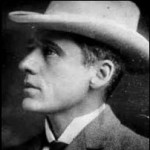
Andrew Barton ‘Banjo’ Paterson
(1864 – 1941)
A Bushman’s Song
I’M travellin’ down the Castlereagh, and I’m a station hand,
I’m handy with the ropin’ pole, I’m handy with the brand,
And I can ride a rowdy colt, or swing the axe all day,
But there’s no demand for a station-hand along the Castlereagh. +
So it’s shift, boys, shift, for there isn’t the slightest doubt
That we’ve got to make a shift to the stations further out,
With the pack-horse runnin’ after, for he follows like a dog,
We must strike across the country at the old jig-jog.
This old black horse I’m riding—if you’ll notice what’s his brand,
He wears the crooked R, you see—none better in the land.
He takes a lot of beatin’, and the other day we tried,
For a bit of a joke, with a racing bloke, for twenty pounds a side.
It was shift, boys, shift, for there wasn’t the slightest doubt
That I had to make him shift, for the money was nearly out;
But he cantered home a winner, with the other one at the flog—
He’s a red-hot sort to pick up with his old jig-jog.
I asked a cove for shearin’ once along the Marthaguy:
“We shear non-union here,” says he. “I call it scab,” says I.
I looked along the shearin’ floor before I turned to go—
There were eight or ten dashed Chinamen a-shearin’ in a row.
It was shift, boys, shift, for there wasn’t the slightest doubt
It was time to make a shift with the leprosy about.
So I saddled up my horses, and I whistled to my dog,
And I left his scabby station at the old jig-jog.
I went to Illawarra, where my brother’s got a farm,
He has to ask his landlord’s leave before he lifts his arm;
The landlord owns the country side—man, woman, dog, and cat,
They haven’t the cheek to dare to speak without they touch their hat.
It was shift, boys, shift, for there wasn’t the slightest doubt
Their little landlord god and I would soon have fallen out;
Was I to touch my hat to him?—was I his bloomin’ dog?
So I makes for up the country at the old jig-jog.
But it’s time that I was movin’, I’ve a mighty way to go
Till I drink artesian water from a thousand feet below;
Till I meet the overlanders with the cattle comin’ down,
And I’ll work a while till I make a pile, then have a spree in town.
So, it’s shift, boys, shift, for there isn’t the slightest doubt
We’ve got to make a shift to the stations further out;
The pack-horse runs behind us, for he follows like a dog,
And we cross a lot of country at the old jig-jog.
Andrew Barton Paterson poetry
fleursdumal.nl magazine
More in: Archive O-P, CLASSIC POETRY

Andrew Barton ‘Banjo’ Paterson
(1864 – 1941)
Australian Scenery
The Mountains
A land of sombre, silent hills, where mountain cattle go
By twisted tracks, on sidelings deep, where giant gum trees grow
And the wind replies, in the river oaks, to the song of the stream below.
A land where the hills keep watch and ward, silent and wide awake
As those who sit by a dead campfire, and wait for the dawn to break,
Or those who watched by the Holy Cross for the dead Redeemer’s sake.
A land where silence lies so deep that sound itself is dead
And a gaunt grey bird, like a homeless soul, drifts, noiseless, overhead
And the world’s great story is left untold, and the message is left unsaid.
The Plains
A land as far as the eye can see, where the waving grasses grow
Or the plains are blackened and burnt and bare, where the false mirages go
Like shifting symbols of hope deferred — land where you never know.
Land of plenty or land of want, where the grey Companions dance,
Feast or famine, or hope or fear, and in all things land of chance,
Where Nature pampers or Nature slays, in her ruthless, red, romance.
And we catch a sound of a fairy’s song, as the wind goes whipping by,
Or a scent like incense drifts along from the herbage ripe and dry
— Or the dust storms dance on their ballroom floor, where the bones of the cattle lie.
Andrew Barton Paterson poetry
fleursdumal.nl magazine
More in: Archive O-P, CLASSIC POETRY
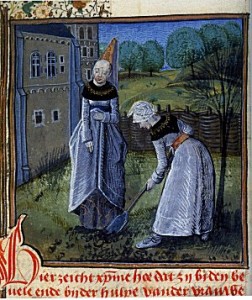
Christine de Pisan
(ca. 1364-1430)
Seulette suis
Seulette suis et seulette veux être,
Seulette m’a mon doux ami laissée,
Seulette suis sans compagnon ni maître,
Seulette suis, dolente et courroucée,
Seulette suis en langueur malaisée,
Seulette suis plus que nulle égarée,
Seulette suis, sans ami demeurée.
Seulette suis à huis ou à fenêtre,
Seulette suis en un anglet mussée,
Seulette suis pour de pleurs me repaître,
Seulette suis, dolente ou apaisée,
Seulette suis, rien n’est qui tant me siée,
Seulette suis en ma chambre enserrée,
Seulette suis, sans ami demeurée.
Seulette suis partout et en tout estre (logis),
Seulette suis où je vais où je siée,
Seulette suis plus qu’autre rien terrestre,
Seulette suis de chacun délaissée,
Seulette suis durement abaissée,
Seulette suis souvent toute éplorée,
Seulette suis, sans ami demeurée.
Princes, or est ma douleur commencée:
Seulette suis de tout deuil menacée,
Seulette suis plus tainte que morée (couleur de mûre),
Seulette suis, sans ami demeurée.
Christine de Pisan poetry
fleursdumal.nl magazine
More in: Archive O-P, Pisan, Christine de
Thank you for reading Fleurs du Mal - magazine for art & literature